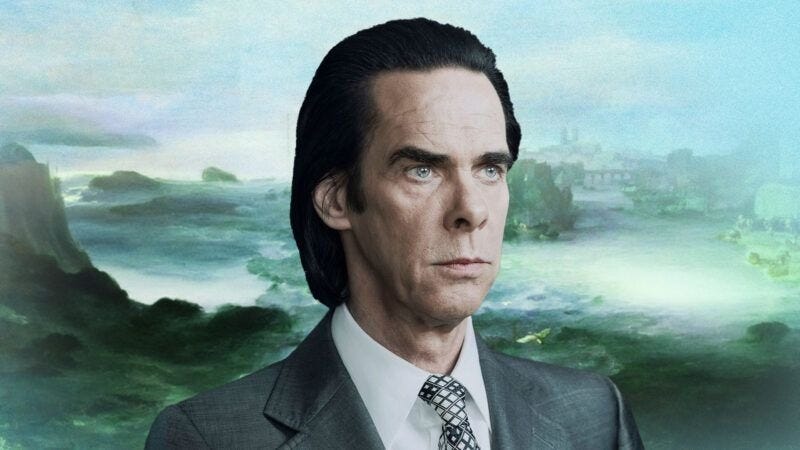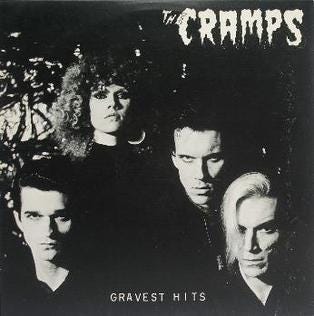Nick Cave: I See the World as 'Systemically Beautiful'
The musician and writer discusses his new album Wild God, Roger Waters and the BDS movement, the role of freedom in seeking transcendence, and how aging helps creativity.
Scroll down to the listen to the podcast!
One of the things I love about my job at Reason—where I’ve punched the clock for 30-plus years, more than long enough to go through cycles of love, hate, frustration, and above all deep and abiding love on an almost hourly basis—is that I get the opportunity to engage with people whose work I not only deeply admire and respect but has shaped the way I think about the world.
That’s certainly the case with the guest on my latest Reason Interview podcast, where I talk with Nick Cave, whose music I’ve been listening to since the mid-1980s (The Bad Seeds’ 1984 LP From Her To Eternity haunts me still). After graduating college in ‘85, I worked at a number of movie, teen, and music mags in NYC, including the US version of the British new wave mag Smash Hits, where a couple of my officemates dressed like they were in The Cure on a daily basis. I loved music—everything from Neil Young and Dylan and psychedelic rock that mostly happened before my time to punk and all the stuff that washed ashore in America like New Order, PiL, Kate Bush, and Nick Cave and The Bad Seeds and countless other bands that created alternative universes you could visit whenever you dropped the needle on the stereo.
I had a special soft spot for the stuff riffing on monster movies and horror—bands like The Ramones did this and especially The Cramps, who pioneered what was sometimes called shockabilly or psychobilly music—campy yet heartfelt callbacks to a Chiller Theater of the mind. At one point, I was summoned to interview Nik Fiend of the ultra-goth band Alien Sex Fiend, at a room in the storied Chelsea Hotel (if memory serves, they had just released a record called Here Cum Germs). When I knocked on his door, he bade me enter. The room was pitch black but there he was on the other side, in full makeup, with a flashlight lighting up his face dramatically like Dracula in the old movie. As he started talking in a very theatrical way, the towel he’d used to block out the light fell out of the window and sunlight flooded the room, death to vampires. He yelped and writhed as if he was being dunked in holy water and spent a few frantic minutes scurrying around, making the room dark again, and then starting over, doing his Bela Lugosi routine as if nothing happened. What’s not to love about this?
In a far more profound way, Nick Cave helped define what came to be known as goth culture in the post-punk era, and for good reason. His songs, style, and writings showed a (healthy!) preoccupation with death, loss, heaven and hell, addiction, nihilism, and much more that captivated me as an adolescent and young adult and still do. His songs could be filled with violence and emotions that were blacker than the dead of night. But unlike many of his contemporaries, over time, his sensibilities developed and matured to a place where he was capable of writing songs like Into My Arms, which is a masterpiece of mood and insight into the human condition.
It’s a hell of a thing to be alive and know that you will die some day, as will all the people and things you love. This troubling insight, of course, is simply the starting point and what you choose to do with it defines your life. It’s inspiring to see Cave, now in his late 60s and after a series of heartbreaking losses, be more creative and passionate than ever in his life.
What I’ve always found energizing and mesmerizing in Cave’s work (which includes soundtracks, novels, appearances in movies such as Wings of Desire, and 2022’s remarkable book, Faith, Hope, and Carnage) is that a world of inherent loss and tragedy—and he knows more of this than most of us ever will—isn’t a prompt for nihilism, complacency, or cheap affirmations but for Sisyphean attempts to build a better world and to reach toward the heavens. That dynamic is captured beautifully in ‘Frogs,’ one of the songs on his new album with The Bad Seeds, Wild God:
In the Sunday rain
The frogs are jumping in the guttersOh, leaping to God, amazed of love
And amazed of pain
Amazed to be back in the water again
In the Sunday rain
During the course of our conversation—taped at Electric Lady, the Greenwich Village studio created by Jimi Hendrix—we talk about the evolution of his public persona over the years, how the death of his 15 year-old-son changed his art (and much more in his life), and why he refuses to join artist boycotts of countries such as Israel (he’s pushed back against people such as Roger Waters, a major proponent of BDS).
I was especially interested in talking with him about his website The Red Hand Files, where he answers readers' questions in a manner that is deeply vulnerable, touching, and insightful. He’s been doing that since 2018, has read over 100,000 fan letters, and has been defending free speech and artistic license in a way that is absolutely inspiring and important, especially during an era of heightened sensitivities.
Here is a guide to topics we discuss. Note: There is no video, even on the YouTube version.
0:00—Introduction
1:09—Ad: The Dispatch
2:15—The Red Hand Files
8:13—Connecting with audiences after loss
16:20—The Birthday Party's early days in London
20:10—Is Nick Cave a "goth"?
25:19—Ad: Bank On Yourself
27:09—New album, Wild God
29:53—Transcending cynicism and contempt
33:23—AI, pessimism, and losing avenues of meaning
39:35—Religious yearning and doubt
45:32—Defending free thought and expression
48:25—Kanye West's antisemitism and extraordinary creations of gospel music
50:26—Antisemitism, Jews, and Israel
52:47—Roger Waters, Brian Eno, and Boycott, Divestment, and Sanctions (BDS)
58:33—Brief stint in Los Angeles
59:50—Loss and creation during COVID-19
1:03:10—Social media and censorship
1:05:10—The freeing effects of aging
Today's sponsors:
Bank On Yourself: Bank On Yourself is a proven retirement plan alternative that banks and Wall Street are desperately hoping you never hear about. It gives you guaranteed, predictable growth and retirement income; access to your money for any purpose with NO questions asked and NO government penalties or restrictions; and the peace of mind that comes from knowing the minimum guaranteed value of your retirement savings on the day you plan to tap into them. Go to Bank On Yourself.com/WORD and get a free report about the retirement plan alternative that lets you bypass banks and Wall Street, and take back control of your financial future.
The Reason Speakeasy. The Reason Speakeasy is a monthly, unscripted conversation in New York City with outspoken defenders of free thinking and heterodoxy that doubles as a live taping of The Reason Interview With Nick Gillespie. The next event is scheduled for Wednesday, September 11, and features Fox News' Kat Timpf, whose new book is I Used To Like You Until…(How Binary Thinking Divides Us). Tickets are $15 and include beer, wine, soft drinks, and food. Go here for details.



Nick, this is so cool. Can't wait to listen.
Thanks for promoting a Real Artist. We sure could use more of that.